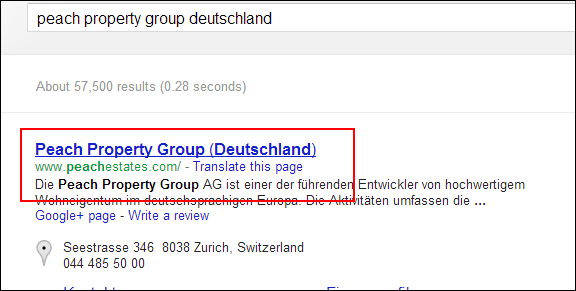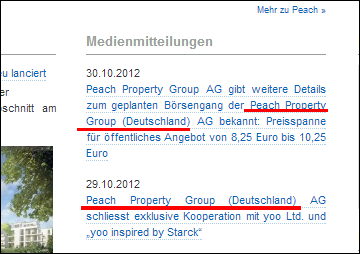How Google is Using Multiple Elements of a Page to Construct Search Results
Roland discusses how Google is choosing from all items of content on a page to construct search results, and discusses the implications for site owners.
The Fall of Title and Meta Description Tags
We recently build a website (http://www.peachproperty.de/) for the German arm of one of our clients, the Peach Property Group. Previously we’d also built them the site for their corporate office which is based in Switzerland (http://www.peachestates.com/).
We decided to see how the new site, http://www.peachproperty.de/, appears in search results, so we searched on Google for “peach property group deutschland”. After all, the Title tag of http://www.peachproperty.de/ is:
Peach Property Group Deutschland
At this point it’s worth higlighting that the Title tag of http://www.peachestates.com/, the older, corporate site based in Switzerland is:
Peach Property Group
What we see when we actually look at the search results (on google.ch, google.de and google.co.uk) is a search result for http://www.peachestates.com/, where the title of the search result is “Peach Property Group (Deutschland)”:
What’s really interesting is that “Peach Property Group (Deutschland)” does not feature in the Title tag of the http://www.peachestates.com/ page. The only mentions of that specific combination of words is in a few links to press releases elsewhere on the site.
Google has quite clearly taken the decision itself to present this tiny snippet as the title of this particular search result.
Implications for Site Owners
The most obvious implication is that site owners have less control over how their content appears in search results. There was always some ambiguity as to whether Google would use your Title and Meta Description tag (particularly if they didn’t use the words and phrases your visitors use when searching), but if Title and Meta Description tags were carefully constructed there was a reasonable chance that they would heavily influence a search result. This now appears to be less certain.
The main implication is that website owners should move away from thinking about individual tags on a page, and think more about how all aspects of that page work together to communicate the meaning of the pages content. If you could put the Title, Meta Description, heading tags, and URL all together what would that combination say?
And perhaps more importantly, what should that combination say?
Think Relevance
The greatest implication we take from this is that site owners should construct their content around what people want, around the words and phrases that they actually use online, be it when they’re searching or expressing themselves on social networks. That when content is constructed all key items of HTML should be carefully woven together to construct an item of content that as much as possible directly matches these different forms of self-expression.
Google is constantly working to improve its search results, to deliver search results that are the most relevant to the things that we search for. Building content in the manner we discuss above provides visitors with exactly that. This is the kind of content that Google loves.
For further information on this approach to building content (for small and enterprise-scale sites), please see our article on “Relevance Analysis”.

